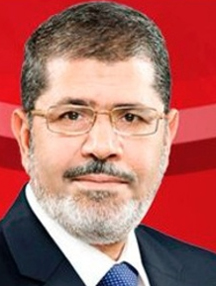CAIRO, (Reuters) – Islamists battled with protesters outside Egyptian President Mohamed Mursi’s palace yesterday, after his vice president suggested amendments could be agreed to the draft constitution that has divided the nation.
Fires burned in the streets near the palace perimeter where opponents and supporters of Mursi threw stones and petrol bombs. Riot police tried to separate the two sides, but failed to halt fighting that extended from Wednesday into the early morning.
Residents, frustrated that police had not calmed the streets, set up makeshift road blocks nearby to check passers-by, scenes reminiscent of the popular uprising that toppled Mursi’s autocratic predecessor Hosni Mubarak.
Five people were killed and 350 injured in the clashes, according to a statement released by the Ministry of Health.
“No to dictatorship,” Mursi’s opponents chanted, while their rivals chanted: “Defending Mursi is defending Islam.”

Mursi’s opponents accused him of creating a new autocracy by awarding himself extraordinary powers in a decree on Nov. 22 and were further angered when an Islamist-dominated assembly pushed through a draft constitution that opponents said did not properly represent the aspirations of the whole nation.
The United States, worried about the stability of a state that has a peace deal with Israel and to which it gives $1.3 billion in military aid each year, called for dialogue.
A presidential source said Mursi was expected to make a statement later today. His opponents had earlier called on him to address the nation to help calm the streets.
Bidding to end the worst crisis since Mursi took office less than six months ago, Vice President Mahmoud Mekky said amendments to disputed articles in the constitution could be agreed with the opposition. A written agreement could then go to parliament, to be elected after a referendum on the constitution on Dec. 15.
“There must be consensus,” he told a news conference inside the presidential palace as fighting raged outside on Wednesday evening, saying opposition demands had to be respected.
Prime Minister Hisham Kandil called for calm to “give the opportunity” for efforts underway to start a national dialogue.
Protests spread to other cities, and offices of the Muslim Brotherhood’s political party in Ismailia and Suez were torched.
But Mursi has shown no sign of buckling under pressure from protestors, confident that the Islamists, who have dominated both elections since Mubarak was overthrown in February 2011, can win the referendum and parliamentary election to follow.
On top of the support of the Brotherhood, which backed him for the presidency in the June election, Mursi may also be able to rely on a popular yearning for stability and economic revival after almost two years of political turmoil.
Egypt’s opposition coalition blamed Mursi for the violence and said it was ready for dialogue if the Islamist leader scrapped the decree that gave him wide powers and shielded his decisions from judicial review.
“Today what is happening in the Egyptian street, polarisation and division, is something that could and is actually drawing us to violence and could draw us to something worse,” opposition coordinator Mohamed ElBaradei said yesterday.
“We are ready for dialogue if the constitutional decree is cancelled … and the referendum on this constitution is postponed,” he told a news conference.




